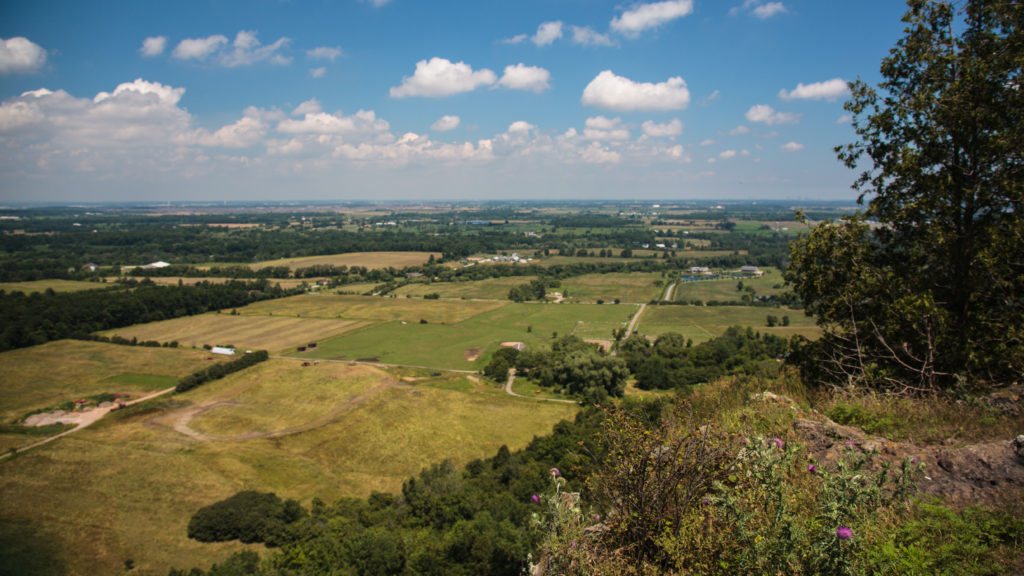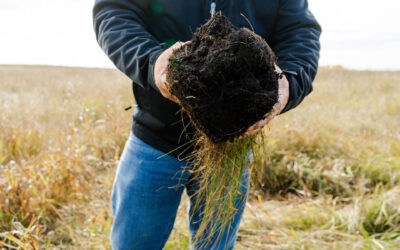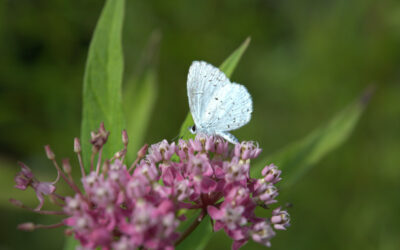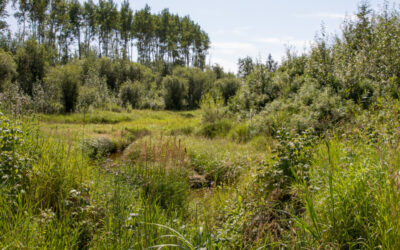Region of Peel, Credit Valley Conservation Authority and Toronto and Region Conservation Authority Partner for ALUS Peel Pilot

The rural landscape in the Region of Peel is incredibly diverse, offering a tapestry of open agricultural space, hedgerows and windbreaks, natural forests, wetlands and rivers.
MISSISSAUGA, MARCH 14, 2022 — ALUS is happy to announce a new community in the Greater Toronto Area (GTA). The ALUS Peel Pilot will help farmers build nature-based solutions to reverse biodiversity loss and address the impacts of climate change, such as flooding, poor water quality and habitat loss, among others.
This new ALUS community will support farmers in the Region of Peel and will help protect the headwaters of the Credit River, Humber River, Etobicoke Creek and Mimico Creek, each of which plays a fundamental role in water quality for downstream communities and Lake Ontario.
“The Region of Peel is pleased to be partnering with Credit Valley Conservation, Toronto and Region Conservation Authority and ALUS Canada to create the ALUS Peel Pilot. Building upon the success and reputation of the Peel Rural Water Quality Program, we are excited to extend additional support to farmers to help them manage their land and water to improve water, soil and air quality and enhance wildlife habitat,” says Jennifer Innis, Regional Councillor, Chair, Toronto and Region Conservation Authority & member of the Peel Agricultural Advisory Working Group.
The Region of Peel is home to nearly 1.5 million residents and is situated within the GTA and the Greenbelt, one of the most densely populated parts of Canada. The southern portion of Peel Region contains the primarily urban municipalities of Mississauga and Brampton, while the Town of Caledon in the north of the region is more rural. Agricultural production is diverse in the region, ranging from fruit and vegetable production, wineries, cideries and breweries to field crop and livestock production.
Farmers in Peel Region have a long-standing relationship with the Region and local conservation authorities, implementing agri-environmental projects on their land for the benefit of nature, their farms, and their communities. Since 2004, the Region of Peel, Credit Valley Conservation (CVC) and the Toronto and Region Conservation Authority (TRCA) have delivered the Peel Rural Water Quality Program, with participation by 19 per cent of the farming community and implementation of environmental projects valued at more than $4.7 million.
The ALUS Peel Pilot extends the existing Peel Rural Water Quality Program to include the ALUS model. The union of these two programs will make more resources available to farmers who are looking to undertake long-term environmental stewardship projects on their land.
“Partnering with the Region of Peel, CVC and TRCA shows that the ALUS model and the farmers who steward the landscape play a critical role in communities that are seeking solutions to the impacts of climate change” says Bryan Gilvesy, CEO, ALUS. “ALUS and the ecological value its participants create is already felt in communities across the country and is proving to be essential in the resilience of even the most densely populated communities in Canada.”
ALUS Peel will adopt of a wide range of natural infrastructure projects, such as tree planting; wetland, stream, and grassland restoration; control of in-field soil erosion; and livestock fencing. These projects will deliver critical ecological outcomes, improving wildlife habitat, soil and water quality and carbon sequestration.
These outcomes are vital for the Region of Peel, which encompasses a diverse and unique landscape, one that is home to several species at risk, like the Jefferson Salamander, Redside Dace, Bobolink and Eastern Meadowlark. It is also home to parts of the Oak Ridges Moraine and the Niagara Escarpment, which represent unique ecologies within Ontario’s Greenbelt and are recognized as areas of national and global importance.
“I encourage every farmer to think critically about their land. If you have areas that are environmentally sensitive, struggle to produce a profitable crop, or are inefficient to farm, consider planting native trees or grasses and wildflowers or constructing a wetland,” says Gary Mountain, Peel Farmer & Chair, Peel Agricultural Advisory Working Group. “With this new opportunity, not only will you receive funding to establish the project, but your ongoing monitoring and maintenance of the site will be recognized with an annual payment of $150 per acre per year.”
The ALUS Peel Pilot wouldn’t be possible without the support of the Greenbelt Foundation. The Greenbelt plays a unique role in Ontario’s food system and is vital to Ontario’s long-term sustainability and prosperity, with over 4,700 working farms within it. It is also home to two specialty crop areas, the Holland Marsh and Niagara Tender Fruit and Grape Area.
The growth of the ALUS network of communities demonstrates the efficacy of a grassroots organization, one where decisions of ecological significance are made at the local level by the farmers who work to implement and maintain the ecosystems in their communities.
About ALUS
ALUS (originally an acronym for Alternative Land Use Services) is charitable organization that sustains agriculture and biodiversity for the benefit of communities and future generations. ALUS provides direct financial and technical support to a network of more than a thousand farmers and ranchers who deliver ecosystem services in more than 30 communities across Canada, such as cleaner air, cleaner water, carbon sequestration, erosion control, flood mitigation, pollinator support and wildlife habitat. Contact us for more information.



